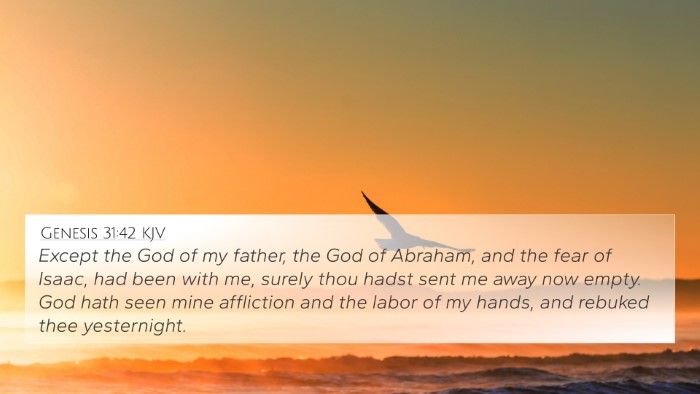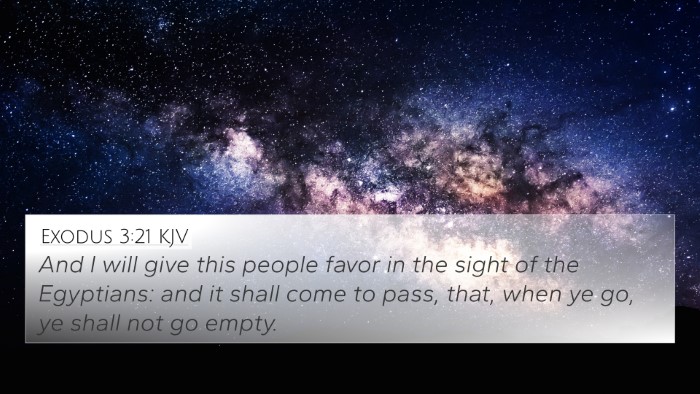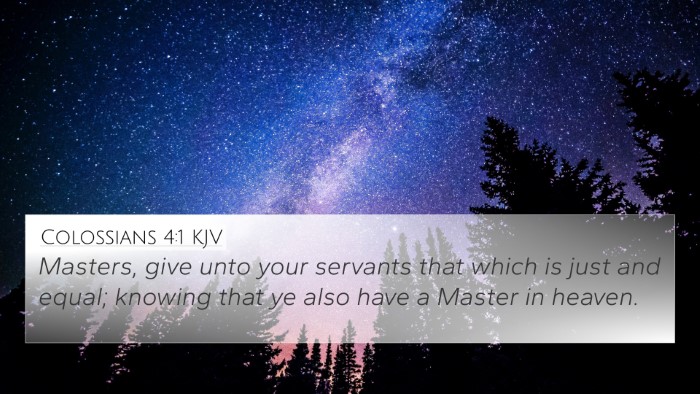Meaning and Interpretation of Deuteronomy 15:13
Verse: Deuteronomy 15:13 states, "And when you send him away free from you, you shall not let him go empty-handed."
Overview
This verse is situated within the broader context of the laws concerning the treatment of Hebrew slaves. It underscores the moral obligation to provide for those who have served you, reflecting the themes of justice and mercy inherent in the Mosaic law.
Commentary Insights
- Matthew Henry: Henry emphasizes the compassion embedded in this command. He explains that the release of a slave should not be a mere formality but should come with generous support to ensure their well-being as they reintegrate into society. He draws parallels to God’s care for His people, which should inspire similar care for those in need.
- Albert Barnes: Barnes interprets this injunction as a demonstration of equity and justice. He highlights the societal implications of charity and kindness, suggesting that such provisions are crucial for maintaining social order and harmony. The provision underscores the principle that those who have been benefited should share abundantly with those who are less fortunate.
- Adam Clarke: Clarke contextualizes this verse within the economic and social structures of ancient Israel. He outlines the economic burdens faced by former slaves and stresses the importance of compassion in balancing justice with mercy. Clarke further connects this to the broader biblical theme of generosity and kindness.
Thematic Connections
- Justice and Mercy: The command to not let the freed slave go empty-handed exemplifies the dual themes of justice and mercy that permeate the Bible.
- Social Responsibility: There is significant emphasis on the community's duty to look after the vulnerable, which echoes throughout both Testaments.
- God's Provision: This scripture reflects the biblical motif of God providing for His people, a theme that resonates in passages like Matthew 6:26.
Bible Cross-References
- Exodus 23:11: This verse discusses the sabbatical year and encourages the filling of the poor's needs, showing the spirit of generosity towards the less fortunate.
- Leviticus 25:39-41: It outlines the laws surrounding the treatment and release of Hebrew slaves, echoing the themes of compassion found in Deuteronomy 15:13.
- Proverbs 3:27: This verse instructs readers not to withhold good when it is within their power to act, reflecting the same spirit of giving found in Deuteronomy 15:13.
- 1 Timothy 6:18: In the New Testament, Paul exhorts the wealthy to be generous and willing to share, aligning with the principles presented in the Old Testament about caring for those in need.
- Luke 6:38: Here, Jesus speaks about the principle of giving and receiving, linking the act of charity with future blessings.
- Galatians 6:10: This New Testament exhortation reinforces the idea of doing good to all, particularly to those in the household of faith, paralleling the call for generosity found in Deuteronomy.
- Matthew 25:35-40: In these verses, Jesus identifies Himself with the needy, highlighting the importance of caring for others as if they were caring for Him.
Applying the Teaching
The charge in Deuteronomy 15:13 serves as a timeless reminder of social responsibility and the ethical interplay between justice and mercy. This commandment is particularly relevant today as it calls upon individuals and communities to extend generosity and foster an environment where the marginalized are supported and uplifted.
Tools for Cross-Referencing
Utilizing tools like a Bible concordance or a cross-reference guide can greatly assist in exploring the connections between verses. Here are some methods:
- Bible Cross-Reference Guides: These can help identify verses associated with themes of justice and mercy.
- Bible Chain References: Following chains can provide an understanding of how themes progress throughout the Scriptures.
- Comparative Studies: Diving into detailed studies of different Biblical narratives enables deeper insights into intertextuality.
Conclusion
Deuteronomy 15:13 serves as a powerful reminder of the need for compassion and generosity. By intertwining justice with mercy, and encouraging the faithful to provide for those in need, this verse illustrates the heart of God’s intention for human relationships. For further studies, consider exploring the Bible verse cross-references related to this teaching to deepen your understanding.









